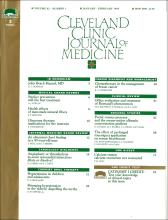ABSTRACT
BACKGROUND Breast cancer has become a national health problem, affecting more than 180 000 women each year. Although advances in early detection and treatment have been made, it remains the second leading cause of cancer-related death in women.
KEY POINTS The treatment of breast cancer requires the careful integration of systemic and local methods. Although the application of hormonal therapy or chemotherapy is becoming less distinct, this discussion will review the important clinical trials and future directions of chemotherapy in the management of breast cancer. Data support the use of chemotherapy in the adjuvant setting, for preoperative tumor reduction of locally advanced disease, and as palliation in metastatic disease. The optimal chemotherapeutic regimen is not known; however, data support a role for adjuvant doxorubicin in node-positive disease, neoadjuvant therapy for high-risk disease, and high-dose chemotherapy to consolidate responding metastatic disease.
CONCLUSIONS The clinician must determine the risks and potential benefits of systemic chemotherapy before recommending treatment strategies. Although progress has been made, future advances can only occur through active participation in clinical trials.
- Copyright © 1995 The Cleveland Clinic Foundation. All Rights Reserved.






